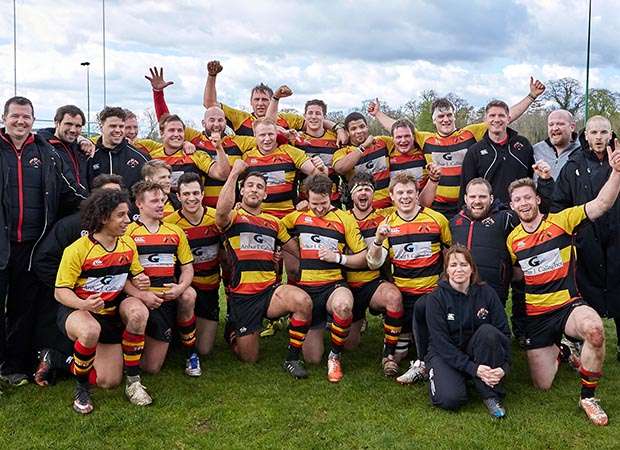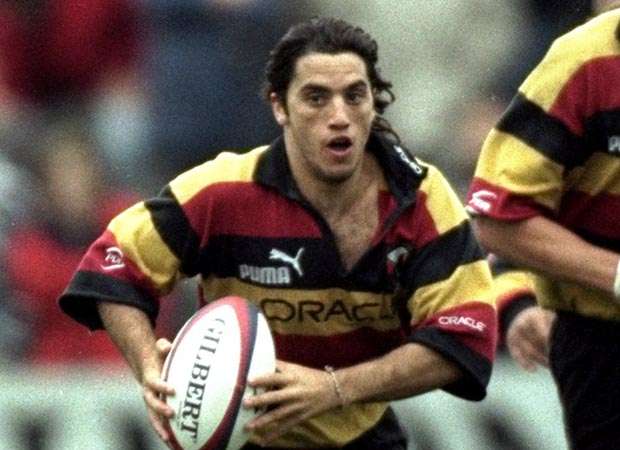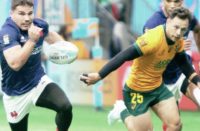 It's six weeks ago now, after a regular Tuesday night training session, that Richmond director of rugby Steve Hill and club chairman Peter Moore called an ad hoc meeting of Richmond's expanded first team squad in their perennially ramshackle, but delightfully cosy and undeniably historic clubhouse. Having ordered up the beers everybody awaited with some anticipation as Hill and Moore finally called for a bit of hush.
It's six weeks ago now, after a regular Tuesday night training session, that Richmond director of rugby Steve Hill and club chairman Peter Moore called an ad hoc meeting of Richmond's expanded first team squad in their perennially ramshackle, but delightfully cosy and undeniably historic clubhouse. Having ordered up the beers everybody awaited with some anticipation as Hill and Moore finally called for a bit of hush.
It was another important moment for a club already steeped in history. The time had come to acknowledge the fact that unless they messed up spectacularly in the final weeks of their National One campaign Richmond were going to win promotion to the Championship. And that in turn meant that by September this year they – full-time amateurs who put in 40-50 hour weekly shifts at their proper jobs – would be playing the likes of London Irish and possibly Bristol if for any reason the latter don't make it back to the Premiership this year.
London Welsh, just around the corner, would also be regular opponents with their wealth of recent Premiership experience along with ambitious co-tenants London Scottish. The level of rugby Richmond would be playing was about to take a massive hike.
Hill and Moore started to spell out exactly what promotion to the Championship would entail if they accepted the honour and challenge. From September they would be up against largely full time professional players. These games wouldn't be one-off Cup encounters in which you could steadily build towards before taking your foot off the pedal slightly, they would come at you remorselessly week after week regardless of what stresses and strains you were experiencing at work.
There would be probably a minimum of three Friday night fixtures and a likelihood of Sunday games, perhaps to fairly far-flung locations like Cornish Pirates in Penzance or Yorkshire Carnegie. How would they feel about having to be at work at 8am the next morning after such games and road trips?
Despite their already busy lifestyles the reality was that everybody in the Richmond 1st XV squad would also need to find time for at least two more intensive gym sessions a week. Already they commit to two team training sessions a week – Tuesday and Thursday nights – and two gym sessions. As amateurs they are theoretically free to eat and drink what they want but from September onwards that would have to change as well – proper recovery and a well thought-out and balanced nutrition had to become a way of life.
“We laid out the whole scenario, the grown up realities of promotion, and I followed that up immediately with an email to our top 50 players, basically our 1st and 2nd XV squads the following day,” says Hill. “I asked a few very simple questions. Firstly did they think it right that Richmond should accept promotion in the event of winning the League? Secondly could they commit to the extra training that would undoubtedly be required and thirdly could they also commit to the extra time needed off to fulfil Friday fixtures and the possible complications of Sunday games. I also invited any further comments or ideas on the subject of promotion generally.
“All 50 replied, virtually straight away, and all 50 said yes to accept the promotion. And of that 50 only two said they couldn't make an extra commitment for the forthcoming Championship season. One was being sent overseas by his company and the other was in line for a promotion which was going to increase his workload and responsibility. It was an ultra-positive and very heart-warming response.
“Those replies, and the comments and observations of the players, have very much dictated how the club wants to go forward with this challenge because without their commitment and dedication we simply won't have a Championship side. End of story.
“One thing that is very clear is that we absolutely don't want to do what some clubs do when they get promoted and that is go out into the market place and recruit a new squad. Yes, there are always, by the nature of things, going to be departures and new arrivals at an ‘amateur' club and, yes, you look for players who might move into the area who seem a good fit with the club.
“But, essentially, we have a group of players here who have earned this promotion and deserve the opportunity to take on an extremely tough but exciting challenge.
“We will give this our best shot, we will go full bore at it for ten months from the moment pre-season training starts, but nothing will diminish us a club. Our mind-set is that we have arrived in the Championship as a club, not just a 1st XV. If it goes well that will be wonderful and if we come straight back down nothing will have changed other than our 1st XV will have experienced a very special and testing season, something they will treasure for a long time.
“We will still have a vibrant happy rugby club that caters for minis, youth, women, vets and all standards of players. We have got over 800 active playing members at Richmond and about 2,500 members. Nothing will change that.”
Richmond's return to the relative “big time” comes 17 years after the professional club was wound up and had to start again in Herts & Middlesex 1, an odyssey that has been well chronicled and observed with some interest.
And as one of the oldest rugby clubs in the world has steadily risen back up through the leagues there was always going to come a crunch moment when a massive decision on their future needed to be made.
That moment of truth finally arrived irrevocably last week when promotion to the Championship was guaranteed with their win at Hartpury. Stay resolutely amateur, become a hybrid semi-professional club or attempt a second stab at professionalism? Which was it to be?
Throughout their recent journey Richmond have also had the advantage – and huge motivation – of seeing their co-tenants and friends at London Scottish make a similar trip, albeit at an accelerated pace. The Exiles, who have an enviably strong sponsorship base and valuable support from the SRU, opted for a semi-professional model when they fought their way into the Championship which has worked well for them although the Scots quantum decision will possibly come if ever they force their way into the play-offs and become real contenders for a place in the Premiership.
Richmond, meanwhile, intend to change as little aspossible in terms or recruitment. They are a natural port of call for good university players – Varsity and red-brick – moving into London to take up their first jobs while another avenue is existing semi-professionals looking to step out of that environment and start a new career path while still wanting to play the best standard of rugby possible.
Richmond have always been, and remain, a well-connected club and are in a better position than most to provide such players with valuable contacts and point them in the right direction.
Elsewhere Richmond have always attracted their fair share of itinerant ‘colonial' players looking to spend some time in a particularly pleasant part of the London while there is a strong connection with Argentina thanks to the likes of former players Gus Pichot and Felipe Contepomi.
 Indeed the Pumas and their families and camp followers took over the Richmond clubhouse for a post-World Cup party following their World Cup semi-final defeat against Australia last October. The connection remains and this season has seen Argentinian flankers Mateo Zambruno and Guiseppe Salustri with the club.
Indeed the Pumas and their families and camp followers took over the Richmond clubhouse for a post-World Cup party following their World Cup semi-final defeat against Australia last October. The connection remains and this season has seen Argentinian flankers Mateo Zambruno and Guiseppe Salustri with the club.
There is also an excellent relationship with Harlequins who place two of their academy players with Richmond each season and unlike some bigger clubs Quins seem happy for those players to train and play with “feeder club” for the season, only calling them back in extremis. This season Richmond have benefitted from the services of prop Seb Adeniran-Olule and wing Henry Cheeseman under this arrangement.
The move from National One to Championship rugby should in theory be even more attractive for Quins looking to give their academy players a higher level of rugby and it could be that 3-4 players get placed with Richmond next season.
So the basic squad make-up which Hill will have to work with probably won't change a great deal. Maximising their talents is the real challenge from a coaching point of view: “The guys are amateurs but what we can try and do is to make sure that the backup is as professional as possible – coaching medical, physiotherapy, nutrition, insurance and the rest of it. We need to be the most professional amateurs in the land and, in fact, I suspect that's half the appeal for many of the lads. This is unchartered territory almost and many of them are sharp, switched-on individuals who are very curious to see exactly how far we can take this.
“Flexibility is probably the key, and we need to make things as easy as possible. I am asking for two extra sessions per week so we will source a gym in the City where those based up there can do the extra sessions together in their lunch hours or whenever. We have another large group that live and work roughly in the Clapham area so we are also looking for a local gym to adopt there as well.
“We also have a very good relationship with St Mary's University just down the road where there is a good deal of expertise in sports science and strength in conditioning. Some of their interns will be monitoring the guys with their additional training, just to make sure they are doing the right sessions at the correct intensity.
“Having made that commitment to the two extra sessions a week we need to make sure they are as well run and productive as possible.
“We believe in our amateurism even if I as a coach know that means sometimes players will just not be available. Take our No.8 and captain Chris Davies for example. He is a club stalwart who has played over 160 games in the last five or six seasons and has been one of our star players this season but he has missed two games because he had important family weddings he needed to be at.
“So be it. That's how we chose to conduct ourselves and enjoy our rugby, like the vast majority of the clubs in the country, basically.”


























